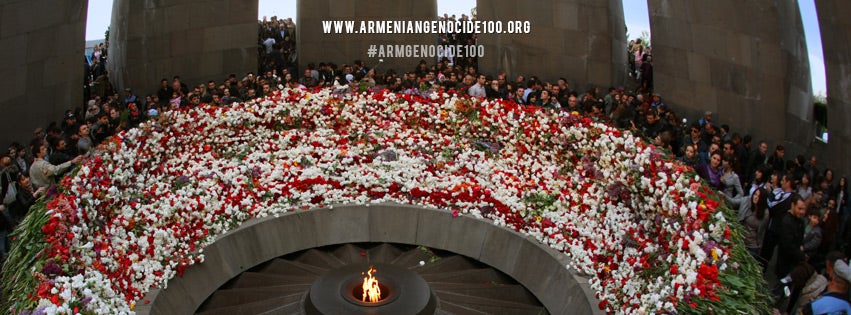Today marks one week before the centennial anniversary of the Armenian genocide. April 24th is the day that Armenians recognize the mass atrocities they experienced in what is now considered one of the first genocides of the 20th century.
In brief, from 1915-1923 up to 1.5 million Armenians, 500,000 Greeks and 275,000 Assyrians were killed through butchering and death marches by the Ottoman Empire and early Turkish state. The Ottomans used a complex system of centrally coordinated deportation and annihilation centers. This sophistication is what makes the Armenian genocide considered the first modern genocide. To this day Turkey rejects the usage of the word genocide and disagrees with the number of those killed. The death counts are approximate due to the difficulty of counting the dead decades after the fact and because Turkey restricts access to the Ottoman archives.
The atrocity of genocide is difficult to put in words; the dry technical language of lawyers can’t grasp the immeasurable suffering and loss that genocide inflicts. To say the least, genocide is a violation of essentially every human right, causes a catastrophic humanitarian crisis, and produces traumatic scars that haunt survivors for the rest of their lives. The Armenian genocide happened long before the creation of the word genocide in 1944 (the term crime against humanity was coined to describe the Armenian genocide), and the world was simply unprepared to handle the atrocity.
Responses to subsequent genocides and atrocities helped develop the field of transitional justice—a system that tries to give survivors a sense of justice after an atrocity when traditional courts are insufficient. Transitional justice uses judicial, social and cultural mechanisms to be legitimate and effective in the eyes of the survivors and the rest of society. Two of the key mechanisms are prosecutions and truth seeking.
After occupation by the Allies, the Ottoman Empire did conduct prosecution of some of the political leaders that orchestrated the Genocide, but the trials were largely dismissed as failures. The Allies sought to develop international trials but they never occurred primarily because at the time there was no international legal framework to prosecute the leaders of the genocide.
Truth seeking involves a variety of methods that all aim to discover the truth about what happened. Accurate information is needed to understand the scope of the crime, recognize all impacted people and all perpetrators, and to create long-lasting and accepted official memorials. Underpinning all truth seeking is the premise of a right to truth: a right of victims to know what happened to them.
The modern state of Turkey denies the Armenian genocide and spends millions to cast doubt on the accepted historical understanding. The denial is so intense that Turkish historians that don’t toe the line have been punished and Prime Minister Erdogan even condemned Pope Frances and called the EU part of an “evil front” for their recognition of the Genocide.
The combination of Turkey’s sophisticated denial machine, the general unimportance of Armenians on the world stage, and the indifference of third parties has allowed a hundred years to go by without any comprehensive attempt to bring justice to the victims and survivors. While still inexcusable, it’s entirely understandable that after decades of waiting for justice, Armenian terrorists organized to assassinate Turkish leaders involved with the Genocide.
With this centennial anniversary, the world’s attention is placed on the events of 1915. There is no better time to right a historical wrong. Obviously nothing can be done to undo the Genocide, but everything can be done to settle the issue by recognizing the Genocide and never forgetting.
Two types of recognition are important: political and personal. Political recognition is essential to fight impunity, especially because of Turkey’s attempts to hide the past. The lower chamber of the European Court of Human Rights in Perinçek v. Switzerland (currently on appeal in the Grand chamber) rejected a belief of a “general consensus” regarding the Armenian genocide because only a few States have ever officially recognized it. Personal recognition is important to never forget. Forgetting that such a horrendous crime took place, such as by thinking that the victims are foreign and unrelatable, lays the ground open for another atrocity or genocide to occur. In the words of Hitler from 1939, “who, after all, speaks today of the annihilation of the Armenians?”

